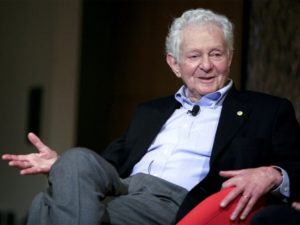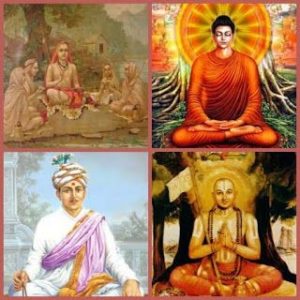Swamiji is the Vice-Chairman of the Mata Amritanandamayi Math and the senior-most disciple of Indian spiritual leader Sri Mata Amritanandamayi Devi (Amma). He is the author of several books, the latest of which is titled The Irresistible Attraction of Divinity.
Religious texts of all faiths present God as the embodiment of compassion, love, selflessness, and other noble qualities. But is it possible to speak with God? Can that Divinity be seen, touched, felt, and experienced?It can be — in and through the perfected spiritual masters.
Permanently established in the state of oneness with the Divine — the unalterable truth of existence — they verily are God, the extraordinary, in an ordinary human form. It is through associating with and observing them that we come to tangibly understand that God exists. It is through them, that we come to behold God’s glory, feel God’s power, and experience God’s beauty. Thus, it is the Guru who serves as the bridge — a link between the world of name and form and the nameless and formless Supreme Being. That bridge takes us to God. Therefore, even though the calendar of Sanātana Dharma is a continuous succession of religious and spiritual observances, for the disciple, the most sacred is Guru Pūrṇima.
 Dr. Leon M. Lederman, awarded a Nobel Prize for Physics in 1988, and a particle physicist and scientist at the Los Alamos National Laboratory, where America worked on the atom bomb as part of the Manhattan Project, recently shared something with me. Once he was asked by a group of highschool students, if he had any message for them. He replied, “I don’t know, I don’t know, I don’t know.” Dr. Lederman was emphasizing the importance of humility — that our attitude should be “how little we know about the universe.” Dr. Lederman was the one who coined the term “God Particle” for the Higgs boson. He wrote a book called Symmetry and the Beautiful Universe, in which he states that it is his belief that everything in the cosmos is interconnected, from the tiniest particle to the most massive planet.
Dr. Leon M. Lederman, awarded a Nobel Prize for Physics in 1988, and a particle physicist and scientist at the Los Alamos National Laboratory, where America worked on the atom bomb as part of the Manhattan Project, recently shared something with me. Once he was asked by a group of highschool students, if he had any message for them. He replied, “I don’t know, I don’t know, I don’t know.” Dr. Lederman was emphasizing the importance of humility — that our attitude should be “how little we know about the universe.” Dr. Lederman was the one who coined the term “God Particle” for the Higgs boson. He wrote a book called Symmetry and the Beautiful Universe, in which he states that it is his belief that everything in the cosmos is interconnected, from the tiniest particle to the most massive planet.
Thousands of years before contemporary and modern science began to venture into the mysteries of the universe, the ancient sages — with indisputable logic and analysis — established the existence of a super intelligence residing behind time and this world of diversity. They called it Brahman — the Absolute Consciousness and the Supreme Self. Having pierced the veil covering this precious truth, they shared their knowledge with the next generation of seekers, thereby giving birth to the guru-disciple lineage, which continues to this day. Guru Pūrṇima is the day when we acknowledge our indebtedness to the lineage and to all the enlightened masters strung like various precious gems on that invaluable necklace.
A “physicist” is called such because of his deep knowledge of the interactions between matter and energy. As a talented actor, singer or painter who embodies his or her art is called an artist, so too the doctors, teachers, etc. Such practitioners become masters by diving deeply into their field and thus gain a certain degree of oneness with it. These masters don’t remain on the surface of their subject. Thus, it is not uncommon for people to address them as incarnations of their particular subject or art form. In a similar manner, the Satguru — who knows the Supreme Totality, Brahman — has become one with that totality and is addressed and honored as such. Guru Pūrṇima is a day for remembering this. As the Muṇḍaka Upaniṣad says, “Anyone who knows that highest Brahman becomes Brahman indeed. In his line, none who knows not Brahman will be born. He crosses grief, virtue and vice, and, freed from the knots of the heart, becomes immortal.”
 For the true disciple or devotee, there is no other God than his Guru, and he remembers his Guru with every breath. Still, he sets aside the first full moon day after the summer solstice as a time to reaffirm his debt and gratitude to his Guru and to rededicate himself to his path and Master. It is a time for the disciple and devotee to reflect on the progress they have made and take stock of where they have yet to go. As Amma, Sri Mata Amritanandamayi Devi, the Guru at whose Lotus Feet I have taken refuge, says, “On this day, we should do a little self-analysis. Looking at our actions and attitudes, we should ask ourselves, ‘Where I am profiting? Where am I taking losses?’ We should make a sincere resolve to safeguard our spiritual advancements and to renounce our negativities.”
For the true disciple or devotee, there is no other God than his Guru, and he remembers his Guru with every breath. Still, he sets aside the first full moon day after the summer solstice as a time to reaffirm his debt and gratitude to his Guru and to rededicate himself to his path and Master. It is a time for the disciple and devotee to reflect on the progress they have made and take stock of where they have yet to go. As Amma, Sri Mata Amritanandamayi Devi, the Guru at whose Lotus Feet I have taken refuge, says, “On this day, we should do a little self-analysis. Looking at our actions and attitudes, we should ask ourselves, ‘Where I am profiting? Where am I taking losses?’ We should make a sincere resolve to safeguard our spiritual advancements and to renounce our negativities.”
Guru Pūrṇima falls on a night the moon’s light is brightest. In fact, that light is not the moon’s but a mere reflection of the sun. Thus, on this holiest of days, let all disciples and devotees remember that the light in their life has, in fact, come from the Guru. It is a day to feel that humility. As Einstein said, “Everyone who is seriously committed to the cultivation of science becomes convinced that in all the laws of the universe is manifest a spirit vastly superior to man, and to which we with our powers must feel humble.”
Let us all bow down before that great power, which the Guru embodies. For in doing so, we may one day realize that we were never the moon but the Self-Luminous Sun all along.

0 Comments